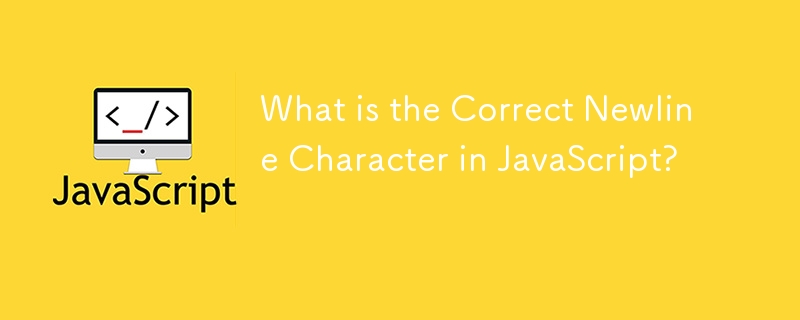

Menyingkap Enigma Aksara Baris Baharu JavaScript
Dalam bidang rentetan JavaScript, konsep jujukan aksara baris baharu muncul. Menentukan urutan yang betul menjadi penting, terutamanya apabila keserasian merentas platform adalah yang paling penting. Mari kita mendalami selok-belok watak ini.
Adakah Watak Garis Baharu Universal dalam JavaScript?
Jawapan kepada soalan ini terletak pada platform dan persekitaran khusus di mana kod JavaScript anda akan digunakan. n sememangnya jujukan aksara baris baharu biasa dalam sistem berasaskan Unix dan diiktiraf sedemikian oleh kebanyakan pelayar. Walau bagaimanapun, platform lain mungkin menggunakan konvensyen yang berbeza.
Bagaimana untuk Menentukan Watak Garis Baharu yang Betul untuk Persekitaran Semasa?
Jika anda perlu memenuhi pelbagai platform yang lebih luas , adalah dinasihatkan untuk menentukan watak baris baharu yang sesuai secara dinamik. Berikut ialah coretan JavaScript yang mencapai perkara ini:
function detectNewlineCharacter() {
const testString = "foo\nbar";
if (testString.match(/\r/)) {
return "\r";
} else if (testString.match(/\n/)) {
return "\n";
} else {
throw new Error("Unable to determine newline character.");
}
}Fungsi ini memeriksa rentetan ujian yang mengandungi kedua-dua aksara CR (carriage return) dan LF (line feed). Dengan mengenal pasti watak mana yang dikenali, ia menentukan watak baris baharu yang sesuai untuk persekitaran semasa.
Atas ialah kandungan terperinci Apakah Watak Baris Baharu yang Betul dalam JavaScript?. Untuk maklumat lanjut, sila ikut artikel berkaitan lain di laman web China PHP!
 Bagaimana untuk mengira yuran pengendalian bayaran balik untuk Keretapi 12306
Bagaimana untuk mengira yuran pengendalian bayaran balik untuk Keretapi 12306
 Pemandu kamera digital
Pemandu kamera digital
 apa itu mysql index
apa itu mysql index
 Apa yang perlu dilakukan jika css tidak boleh dimuatkan
Apa yang perlu dilakukan jika css tidak boleh dimuatkan
 Kandungan utama reka bentuk konsep pangkalan data
Kandungan utama reka bentuk konsep pangkalan data
 Apakah perbezaan antara ruang lebar penuh dan ruang separuh lebar?
Apakah perbezaan antara ruang lebar penuh dan ruang separuh lebar?
 Cara mendaftar e-mel perniagaan
Cara mendaftar e-mel perniagaan
 Apakah pekerjaan di Linux?
Apakah pekerjaan di Linux?




